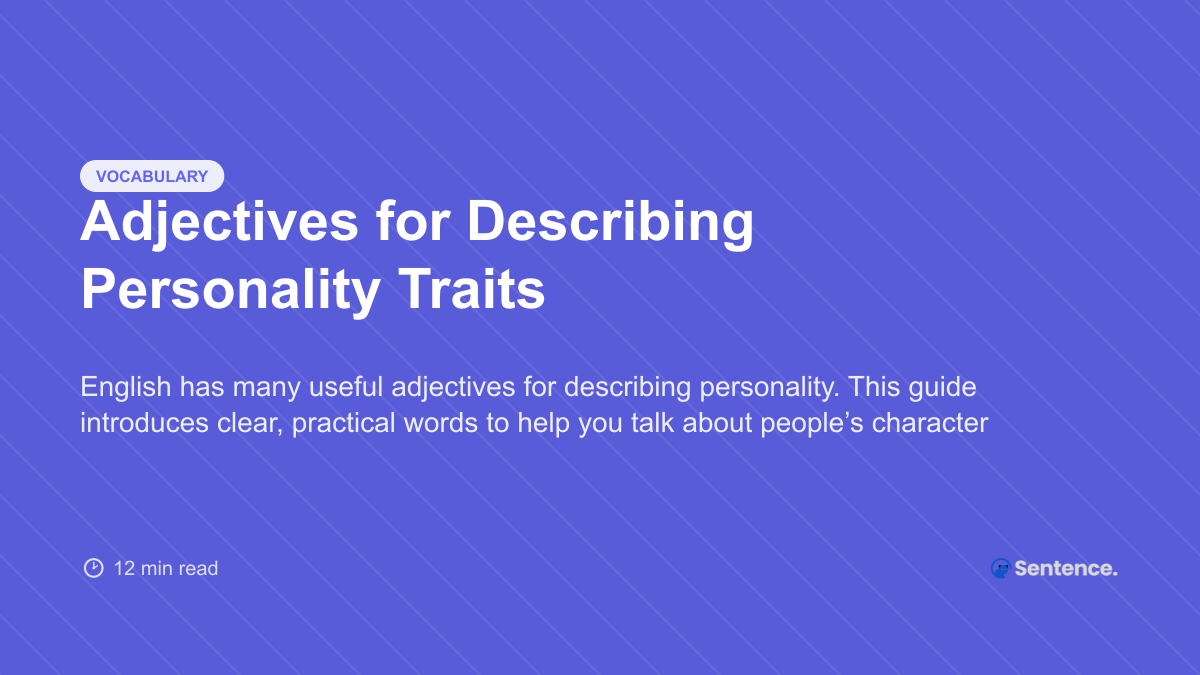
Adjectives for Describing Personality Traits
English has many useful adjectives for describing personality. This guide introduces clear, practical words to help you talk about people’s character accurately and naturally.

English has many useful adjectives for describing personality. This guide introduces clear, practical words to help you talk about people’s character accurately and naturally.
Personality is one of the most common topics in conversations, introductions, and descriptions. Whether you’re talking about friends, coworkers, or characters in a story, using the right adjectives helps you describe someone’s behavior and character more precisely.
This article introduces practical English adjectives for describing personality traits. The words are grouped by positive, neutral, and negative traits, with clear meanings and examples to help you use them naturally in everyday situations.
These adjectives describe people in a good, admirable, or pleasant way. They help you highlight someone’s strengths, good habits, or likable qualities. These words are commonly used in job interviews, essays, and friendly conversations.
| Adjective | Meaning | Example |
|---|---|---|
| friendly | kind and pleasant | Everyone likes her because she's very friendly. |
| honest | always tells the truth | He is known for being honest in all situations. |
| generous | willing to give or help | My uncle is very generous with his time. |
| hardworking | puts a lot of effort into work | She is a hardworking student who never gives up. |
Positive adjectives like these help create a warm and respectful description of someone’s character in both formal and informal contexts.
Some traits are neither positive nor negative; their impression depends on the situation. These adjectives describe behaviors that can be helpful or difficult depending on context, making them especially useful for balanced descriptions.
| Adjective | Meaning | Example |
|---|---|---|
| quiet | not very talkative | He’s a quiet person who prefers listening to speaking. |
| serious | focused and not playful | She has a serious personality at work. |
| independent | able to do things alone | He is very independent and likes solving problems himself. |
| curious | eager to learn or know things | The child was extremely curious about the world. |
Neutral traits like these help describe someone’s style or tendencies without suggesting whether it’s good or bad.
These adjectives describe behaviors that may be difficult, unpleasant, or unhelpful. While they should be used carefully, they are important for honest descriptions in stories, discussions, or evaluations.
| Adjective | Meaning | Example |
|---|---|---|
| lazy | not willing to work or put in effort | He gets called lazy for avoiding chores. |
| stubborn | unwilling to change opinions | She is too stubborn to admit her mistakes. |
| rude | impolite or disrespectful | He sounded rude when he interrupted everyone. |
| bossy | likes to tell people what to do | Some people find her too bossy in group projects. |
Negative adjectives should be used politely, but they help describe real behavior patterns or challenging traits when needed.
Some adjectives describe traits that can be positive or negative depending on the situation. These words are helpful when you want to give a balanced picture of someone’s character, showing both strengths and weaknesses.
| Adjective | Meaning | Example |
|---|---|---|
| ambitious | determined to succeed | She is very ambitious about her career goals. |
| confident | sure of oneself | He’s confident when speaking in public. |
| emotional | expresses feelings strongly | He gets very emotional during sad movies. |
| reserved | keeps feelings private | She is quite reserved around strangers. |
These adjectives help you describe people in a more nuanced way, especially in character analysis, personal reflections, or professional evaluations.
Personality words become easier to learn when you connect them to real people in your life. Think of someone friendly, someone curious, or someone stubborn. Associating each adjective with a real example helps you remember the meaning quickly and use the words naturally in conversation.
Memory Tip:
Think of a real person who matches each trait to make the adjective easier to remember.
Answers: hardworking / stubborn / generous / emotional
⭐ Pro Tip: Use personality adjectives to make your speaking, writing, and storytelling more vivid and natural.
English offers many clear adjectives for describing personality traits, from positive qualities like honesty to more challenging traits like stubbornness. Learning these words helps you express yourself more accurately and describe people with nuance. With a bit of practice, these adjectives will become natural parts of your everyday vocabulary.